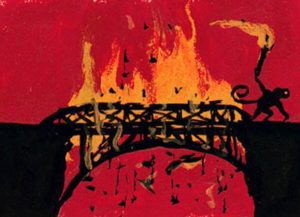It’s been a crazy month for me, so since I’ve been negligent on blogs, you get two of them this week!

When I was in college, my writing professor once told my class not to “burn your bridges” in the publishing world. The reason was simple: it was a small industry, so it would be easy for word to get around. If you had a falling out with an editor or fellow writer, even if you were in the right, it could create a bad reputation. This in turn could damage your chances of getting work. No one will want to publish someone if they’re difficult to work with (unless you’re the late great Harlan Ellison, who got by on sheer talent).
In the internet age, I think this advice has become universal. At my new day job, for instance, a disgruntled customer threatened to “go on social media” and trash the business. I guess that’s how you threaten someone in 2018: internet rumors. It used to be that one only had to worry about whether to put former bosses as references on job applications. If you knew a particular one wouldn’t speak favorably of you, you either left it off or said not to contact them. But as my professor pointed out, in a small industry where everyone knows everyone, it can be a problem. Reputation carries a lot of weight. People may not take to the time to see if what they hear is true or not.
I’ve been thinking about this lately because of a recent falling out I had with a colleague. It made me think back on times when I’ve either burned my bridges or chosen not to. When I lost my first post-college writing job, I vacillated between blaming myself and blaming my bosses. They were kind enough to say I could use them as references, and a few years later at an author fair, I met one of them and said there were no hard feelings from me. On the other hand, an online Christian ministry I volunteered for faithfully for five years more or less “fired” me for nebulous reasons. Since then I’ve completely disassociated myself from them. I don’t talk to anyone who works there nor do I put anyone from there down as a reference.
It gets harder when you realize you’re working with a toxic person, though. When you know they’re abusing and using you. On one hand, you have to draw boundary lines. On the other, you feel the need to warn others about this person. But is this desire motivated by altruism or revenge? Aye, there’s the rub. It’s easy to disguise the latter with the former, especially when you know you could do some serious damage to the abuser.
Because of all this, I started listening to the appropriately titled album “Songs to Burn Your Bridges by” by the hardcore rock band Project 86. Their song “Oblivion” has been resonating with me more than ever. The second verse in particular has become something of a mantra for me:
From somewhere far, far away…
(It’s mine to avenge, I will repay)
A distant voice from some familiar place
(Drive it home in me, pull it out from me)
“Let go the anchor
Let got the deadweight.
(I will repay, I will avenge),
And I’ll change what’s in remiss”
These lines were inspired by a phrase found twice in the Bible. Specifically, in Deuteronomy 32:35 and Romans 12:19. I will confess for someone with as strong a sense of justice as I’m blessed/cursed with, keeping to this tenant of my faith is…difficult. I want to be God’s hammer—His Mjolnir, you could say. But rarely does God allow such things. So, I must patiently wait for Him to vindicate me and set things right. He is, contrary to popular belief, a God of both love and justice. That’s why I have to remove those people from my life: it separates me from the situation and leaves room for God to work.
I hope, True Believers, you can do the same things. Don’t be afraid to get yourself out a bad relationship and/or situation. And when you do, let God bring about His superior justice.
What about you? Have you had to “burn bridges”? What did you do? Did things work out? If so, how?
